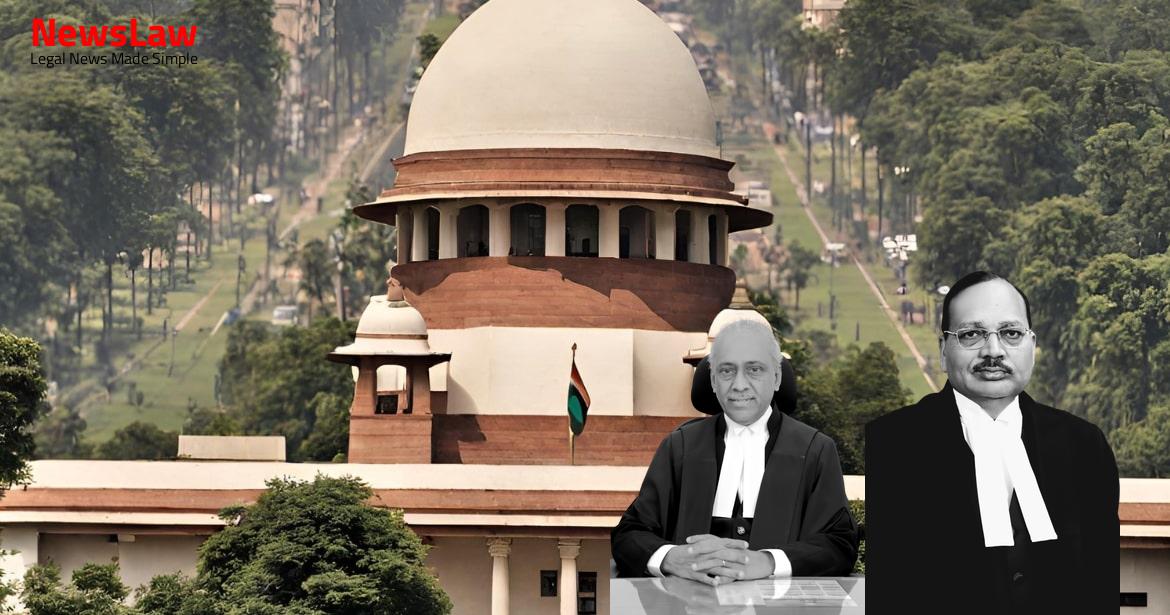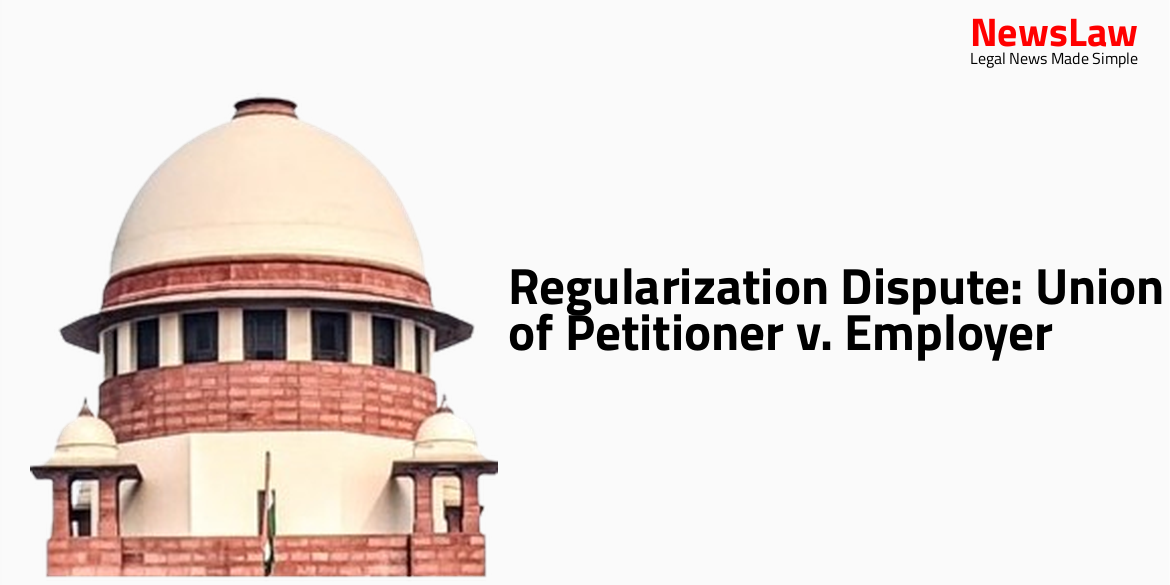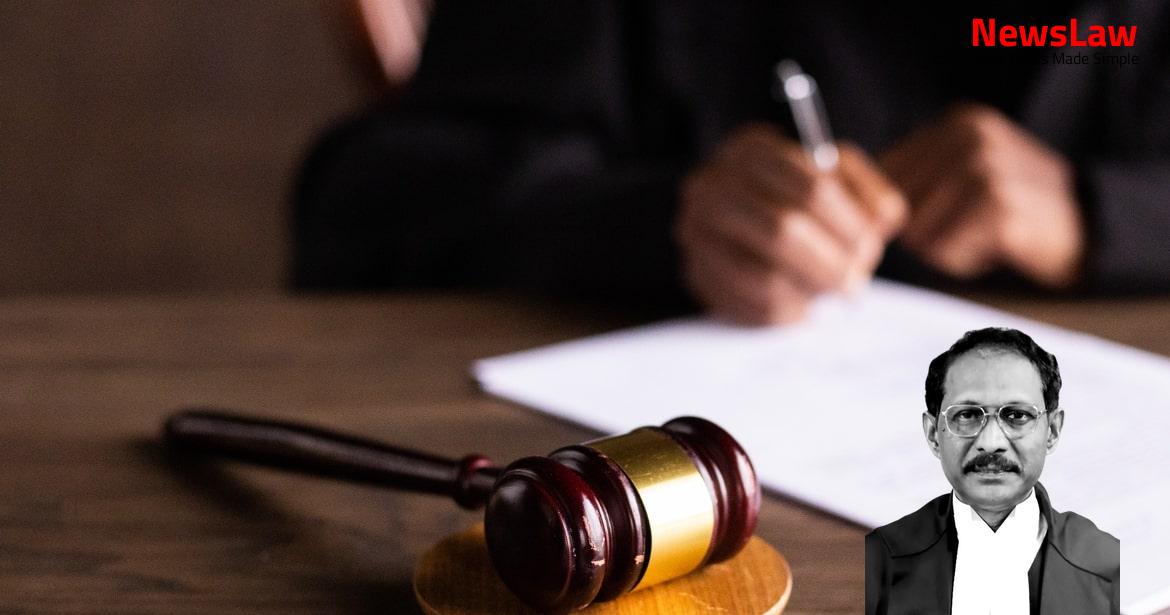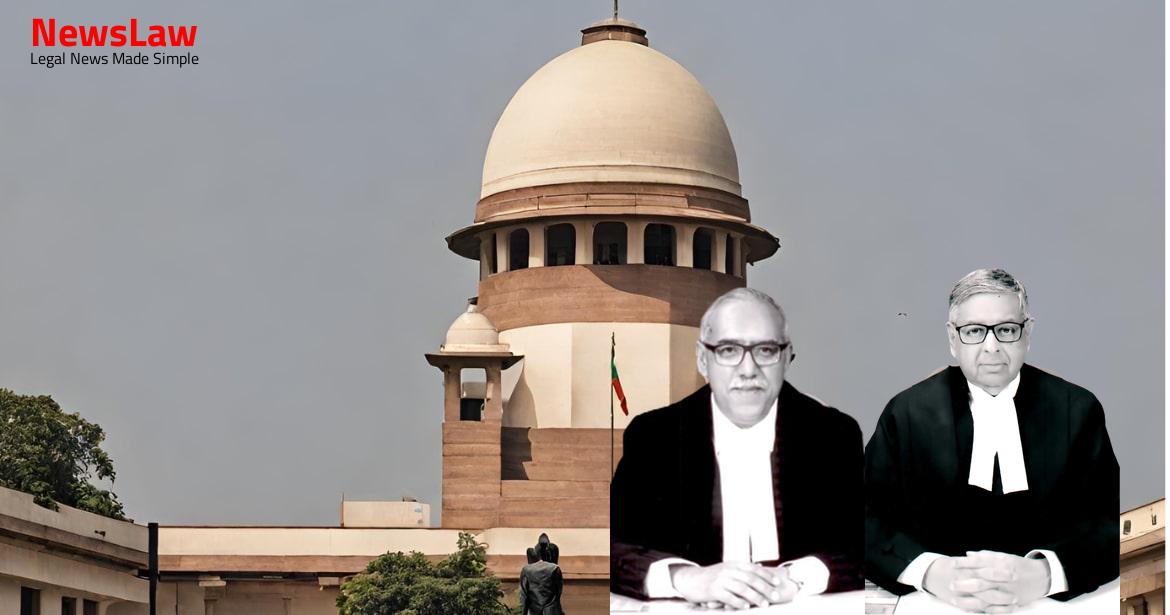In a significant legal development, the Supreme Court of India issues a crucial judgment on industrial dispute resolution, emphasizing fair adjudication in labor cases. The case involves the appellant, a Union activist and General Secretary of the KSRTC and BMTC United Employees Union, and the Corporation as the respondent. Stay tuned for insights on this groundbreaking ruling in the realm of labor laws.
Facts
- The Division Bench found that the Labour Court exceeded its jurisdiction and acted like an Appellate Authority.
- The respondent only cross-examined witnesses during the departmental enquiry and did not submit any evidence.
- The High Court emphasized that a prima facie case does not require full proof, but only enough evidence to establish if believed.
- The Division Bench set aside the order of the Labour Court and the Learned Single Judge for exceeding their jurisdiction.
- The Labour Court’s decision to reject the Corporation’s application under Section 33(2)(b) was based on additional evidence not presented during the enquiry.
- The matter was remitted back to the Labour Court for reconsideration to ensure a fair enquiry process.
- The Division Bench of the High Court ruled that the Labour Court should not have allowed parties to adduce new evidence under Section 33(2)(b) as the scope of enquiry is limited.
- The appellant, a Union activist and General Secretary of the KSRTC and BMTC United Employees Union, sought multiple adjournments but failed to produce any evidence.
- A retired Joint Law Officer of the Corporation served as the Enquiry Officer.
- The appellant remained absent from duty without permission since August 18, 2005.
- Labour Court considered documents from Exs. R1 to R104 produced by the Corporation.
- The Labour Court upheld the fairness of the domestic enquiry held against the appellant.
- The enquiry process took place from September 5, 1998, to August 12, 2010.
- Due to past default charges and previous dismissals, the disciplinary authority took the decision to dismiss the appellant.
- Despite being given opportunities, the appellant did not produce any reply to the charge sheet or evidence during the enquiry.
- The appellant’s unsatisfactory explanation led to the final order of dismissal on October 11, 2010.
Also Read: Ensuring Justice: Amanatullah Khan vs. Commissioner of Police, Delhi – A Landmark Case
Issue
- Relevant consideration for determining prima facie case is whether it was possible to arrive at the conclusion with the evidence presented
- Focus should be on whether the conclusion could have been reached based on the evidence, not on whether it was the only possible conclusion
- Evidence should support the conclusion in question
Also Read: State of Kerala vs. Union of India: Fiscal Responsibility Case
Analysis
- The legislature has provided a self-contained mechanism for adjudication of industrial disputes related to discharge or dismissal of a workman.
- Section 33(2)(b) of the Act does not establish a parallel remedy for adjudication of the same industrial dispute by the same Labor Court or Tribunal.
- When determining a prima facie case, the focus should be on whether it was possible to arrive at a certain conclusion based on the evidence presented.
- The probative value of evidence showing extensive damages to a bus must be carefully considered by the Tribunal.
- Settlement proposals were submitted during mediation, where the appellant demanded 75% of back wages and the Corporation agreed to pay 50%.
- The order of dismissal can still be challenged by raising an industrial dispute even after permission is granted under Section 33(2)(b).
- The Labour Court/Tribunal’s enquiry under Section 33(2)(b) should focus on whether a proper domestic enquiry was held and the workman was afforded a reasonable opportunity to defend.
- The enquiry under Section 33(2)(b) should not involve adjudicatory powers under Section 10(1)(c) and (d) of the Act or consider the proportionality of punishment.
- The order of approval granted under Section 33(2)(b) does not have a binding effect in proceedings under Section 10(1)(c) and (d).
- The Labour Court/Tribunal should follow a two-phase approach while adjudicating industrial disputes under Section 33(2)(b).
- The aim of the Act is to harmonize the management-workmen relationship and prevent labor unrest for industrial growth.
- Chapter-III deals with the reference of disputes to boards, courts, or tribunals.
- Sub-section (2) allows the employer to take punitive action against a workman for misconduct not connected to the pending dispute, provided certain conditions are met.
- The purpose is to prevent the employer from acting vindictively during ongoing dispute proceedings.
- The Act was enacted to address the defects in the Trade Disputes Act, 1929 and provide a mechanism for settling industrial disputes conclusively.
- Section 33(2)(b) grants powers to Boards, Courts, and Tribunals similar to those of a Civil Court when trying a suit.
- Section 11A empowers Labour Court, Tribunals, and National Tribunals to set aside discharge or dismissal orders.
- The provision of Section 33 is aimed at keeping a workman’s conditions unchanged during pending dispute proceedings.
- The employer can take certain actions against a workman for misconduct not connected to the dispute under Section 33(2), with approval from the relevant authority.
- The objective of Section 33 is to prevent adverse changes in a workman’s conditions when industrial dispute proceedings are ongoing.
- The Labour Court has jurisdiction over disputes related to the discharge or dismissal of workmen, including their reinstatement.
- The Act empowers the Labour Court to secure evidence for deciding disputes, ensuring fair adjudication.
- The jurisdiction of a tribunal under Section 33(2) is limited.
- If the domestic enquiry is not defective, the tribunal only needs to be satisfied that there is a prima facie case for dismissal.
- The tribunal does not sit as an appellate court but only considers whether a prima facie case exists for dismissal.
- The standard of proof required in a domestic enquiry is different from that in a criminal trial.
- The Tribunal has to grant or withhold permission based on a prima facie case.
- The order of dismissal, even if approved under Section 33(2)(b), does not attain finality and may face scrutiny if an industrial dispute is raised.
- The scope and object of Section 33(2)(b) cannot be expanded to make the scheme of adjudication under the Act superfluous.
- In proceedings under Section 33(2)(b), the tribunal’s jurisdiction is confined to specific enquiries related to the validity of the domestic enquiry and the employer’s bona fide conclusion.
- The Industrial Tribunal needs to ensure that the dismissal does not amount to unfair labour practice or victimisation.
- If the domestic enquiry is held properly and does not involve unfair practices or victimisation, the tribunal only needs to assess if a prima facie case for dismissal exists.
- Settlement could not take place due to a 25% difference in demand and offer of back wages.
- Appellant not willing to settle, but hope remains for an amicable resolution.
- Encouragement for both parties to make renewed efforts through the Mediation Centre of the High Court of Karnataka.
- Suggestion for a give and take approach to avoid prolonged litigation.
- Proposed compromise where appellant may accept less than 75% back wages and Corporation may offer more than 50% back wages.
- Emphasis on the statutory mediation process as a mode for resolving industrial disputes under the Act.
Also Read: R.C. Sabharwal vs. Income Tax Department
Decision
- Both parties directed to appear before Mediation Centre of the High Court of Karnataka at Bangalore on 4 November, 2019 at 11.00 A.M.
- If dispute is resolved amicably, report to be sent to the Court.
- Mediators will make efforts to end dispute by 3 December, 2019.
- If mediation fails, parties directed to appear before Labour Court at Bangalore on 5 December, 2019.
- Labour Court to decide on merits without influence from suggested amicable settlement.
- Court has not expressed views on case merits.
- Appeal allowed in part, and impugned judgment modified.
- Registry to list matter before the Court for further directions within two weeks of mediation report receipt.
- Stay of proceedings before Labour Court granted by this Court to continue till further directions.
Case Title: JOHN D SOUZA Vs. KARNATAKA STATE ROAD TRANSPORT CORPORATION
Case Number: C.A. No.-008042-008042 / 2019



